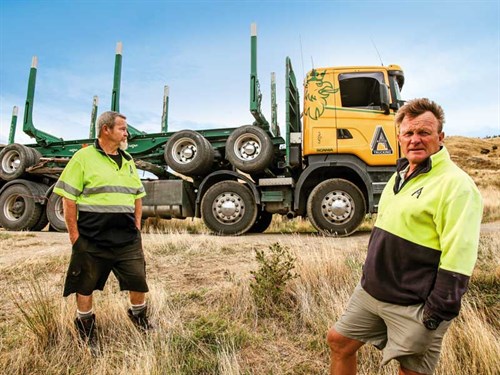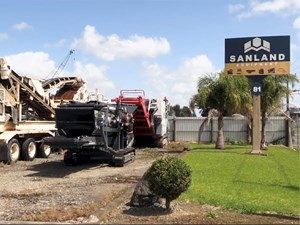Cover story: Akitio Logging







|

|

|
Akitio Trucking now has 25 trucks and has become a sizeable log transport operator DOW checks them out
Pine forests planted in the 1980s on Akitio Station began to come of age in 2009. "We’re harvesting trees that were planted at Akitio Station before 1990—these ones were planted around 1984—and we’ve got a spread of ages through the forest. It’s evolved into a forest rather than a woodlot and has gone from being a little sideline to a major focus," Ed says.
Frustrated because he couldn’t get consistent service getting the wood off site, he bought a couple of his own trucks to do the job in 2009. This later grew to six and were mostly Scanias.
Then last year, on December 1, the opportunity came to buy 13 trucks, largely Kenworth, from the logging division of Burling Transport in Masterton.
"Integrating a new fleet of trucks has been an interesting business and is a big jump from what we had initially. The total truck count of 25 includes some owner drivers."
DOW visited the Akitio forest-logging site behind the tiny coastal settlement of Herbertville and caught up with Shorty Lithgow who manages the trucking side of the operation for Ed.
On the hilltop, just above the skid site, the wind was whipping around as we stood near a couple of bright yellow Scanias waiting to proceed to the site for loading.
The triangular shaped logo is that of Akitio Station, owned by Ed and Jenny Kight, and reflects five generations of family enterprise.
"Yellow was chosen because it’s a standout colour in the bush," says
Shorty, who has been driving logging trucks for more than 30 years and still enjoys it immensely.
"I like logging and the lifestyle surrounding it. My old man was a logging truck driver for years. It gets into your blood and is hard to get out of."
"Yeah," agrees driver Robert Gotty, also working that day. "It’s a different lifestyle compared to other trucking work."
"We’re a different breed," Shorty says, and they both crack up when I suggest they belong to the brotherhood of loggers.
"You either like it or you don’t. You can’t half like it, or if you do, you won’t like it in the end," Robert says.
Shorty adds, "You can either do it, or you can’t. When someone new arrives, I always tell them logging roads start where normal roads finish. It’s a challenge. Every time you come into the skid site you treat it just like the first time you came in. That way you are not going to become complacent.

It helps that you aren’t doing five or more hours driving in one hit. It’s only short bursts of say, two to three hours, which ensures you remain alert."
According to Ed, there seems to be a general lack of harvesting and transport infrastructure throughout the forestry industry. "You could say we are filling some of that gap for the 1700ha of forestry we have here," he says.
And transporting for others in addition to their own operation ensures load efficiency. "The guys are happy to be busy, and we are growing more and more work. However, it takes time to expand existing client contacts and gain new clients, too, so our requirements in different areas is changing as we reallocate trucks to different areas around the southern North Island. Our trucks are currently based in the Manawatu, Masterton, Pahiatua, Matamau, and Hastings/Napier."
As operations manager, Shorty oversees all the management details surrounding the fleet of trucks and drivers as well as keeping his hand in at driving.
He says logging operations are tough on even the most robust trucks. "The roads we come in and out of are extremely challenging and the dust takes a huge toll and gets sucked into the air cleaners. If you look after them, though, they’ll go forever, but normally, they get replaced after about five years."
The trucks are generally serviced at nearby local workshops. Ed manages everything, from building roads and metaling them to forming the skid sites. "I have a guy doing that as well as getting pre-harvest ready with a dozer and digger."
Murray MacDonald of Max Logging is the main harvesting contractor at Akitio.
Forestry works well with the rest of Ed’s farming business. When Ed began farming in 1979, it was "very livestock centric," he says, and the move into forestry just reflects the need to change with the times and is a sound investment.
"It is certainly a better return on this class of land—it wouldn’t be a good return on $40–50,000/ha land on the Heretaunga Plains, for example. It grows good pines and it’s a useful tool by way of intergenerational transfer."
Forestry received a major boost in 2007 with the advent of the Emissions Trading Scheme (ETS) and provided an impetus to do more planting, so it’s an ongoing operation, says Ed.
"We have trees that were harvested last year, planting this year, a pruning crew coming in next week, and harvesting going out other end. It’s very dynamic."
The trucking side of it has been a big learning curve, but it’s just part of running the business.
"It’s all interesting," he says.
Keep up to date in the industry by signing up to Deals on Wheels' free newsletter or liking us on Facebook.





.jpg)


.jpg)








